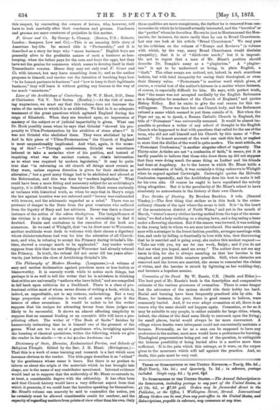Dictionary of Sects, Heresies, Ecclesiastical Parties, and Schools of Religious
Thought. Edited by the Rev. J. H. Blunt. (Rivingtons.)— That this is a work of some learning and research is a fact which soon becomes obvious to the reader. The title-page describes it as " edited " by the gentleman whose name it bears. But there is no preface to inform us about the origin of the materials which he has brought into shape, nor is the name of any contributor mentioned. Internal evidence would lead us to suppose that the authorship of Mr. Blunt co-extends to, at least, a considerable degree with the editorship. It has often been said that Church history would have a very different aspect from that which it presents, if we could hear the heretics speaking for themselves. Mr. Blunt's volume can scarcely be said to contradict the notion, yet he certainly muat be allowed considerable credit for candour, and the capacity of regarding matters from points of view other than his own. Only these qualities are more conspicuous, the further he is removed from con- troversies in which he is himself actually interested, and the "heretics" or the "parties" whomhe describes. He can be just to Montanus and the Mon- tanists, for instance, far more easily than he can to Broad Churchmen. Let any one look at his article "Broad Churchmen." We may pass by the criticism on the volume of "Essays and Reviews" (a volume with which, by the way, many Broad Churchmen would disclaim sympathy), that it is of "third-rate merit;" but it is impossi- ble not to regret that a man of Mr. Blunt's position should describe Dr. Temple's essay as a "plagiarism." A " plagiar- ism" is apt to be understood as being, in plain English, a "theft." The other essays are noticed, not, indeed, in such scurrilous fashion, but with total incapacity for seeing their theological, or even their literary value. " Protestants " is another word which gives, of coarse, a crucial test of the author's fairness in a matter where fairness, of course, is especially difficult for him. He says, with perfect truth, that "the name was not accepted cordially by the English Reformers as a designation for members of the Church of England," and quotes Bishop Ridley. But he omits to give the real reason for this un- willingness. There was then but one Church body, and the Reformers- refused a name which seemed to put them outside of it. But when the Pope- set up, so to speak, a Roman Catholic Church in England, the title of "Protestant" was universally assumed. It would be almost im- possible to produce a writer of any school of thought in the English Church who happened to deal with questions that called for the use of-the term, who did not call himself and his Church by this name of "Pre- testant." No honest account of the word can omit this fact, or neglect to state that the dislike of the word is quite modern. The next article, on "Protestant Confessions," is another singular effort of ingenuity. The Thirty-nine Articles are not "a confession of faith," it seems, yet ;itJS hardly possible to believe that those who drew them up did not 'appease that they were doing much the same thing as Luther and his friends had done at Augsburg. As to the horror in which Mr. Blunt holds a modern confession of faith, it was certainly a thing unknown to Whitgift when he argued against Cartwright. Cartwright quotes the Helvetic Confession repeatedly, and the Archbishop does his best to make it tell for his own side. Of course he ought to have repudiated the unholy- thing altogether. But it is the peculiarity of Mr. Blunt's school to have absolutely no antecedents in the history of their own Church.


































 Previous page
Previous page